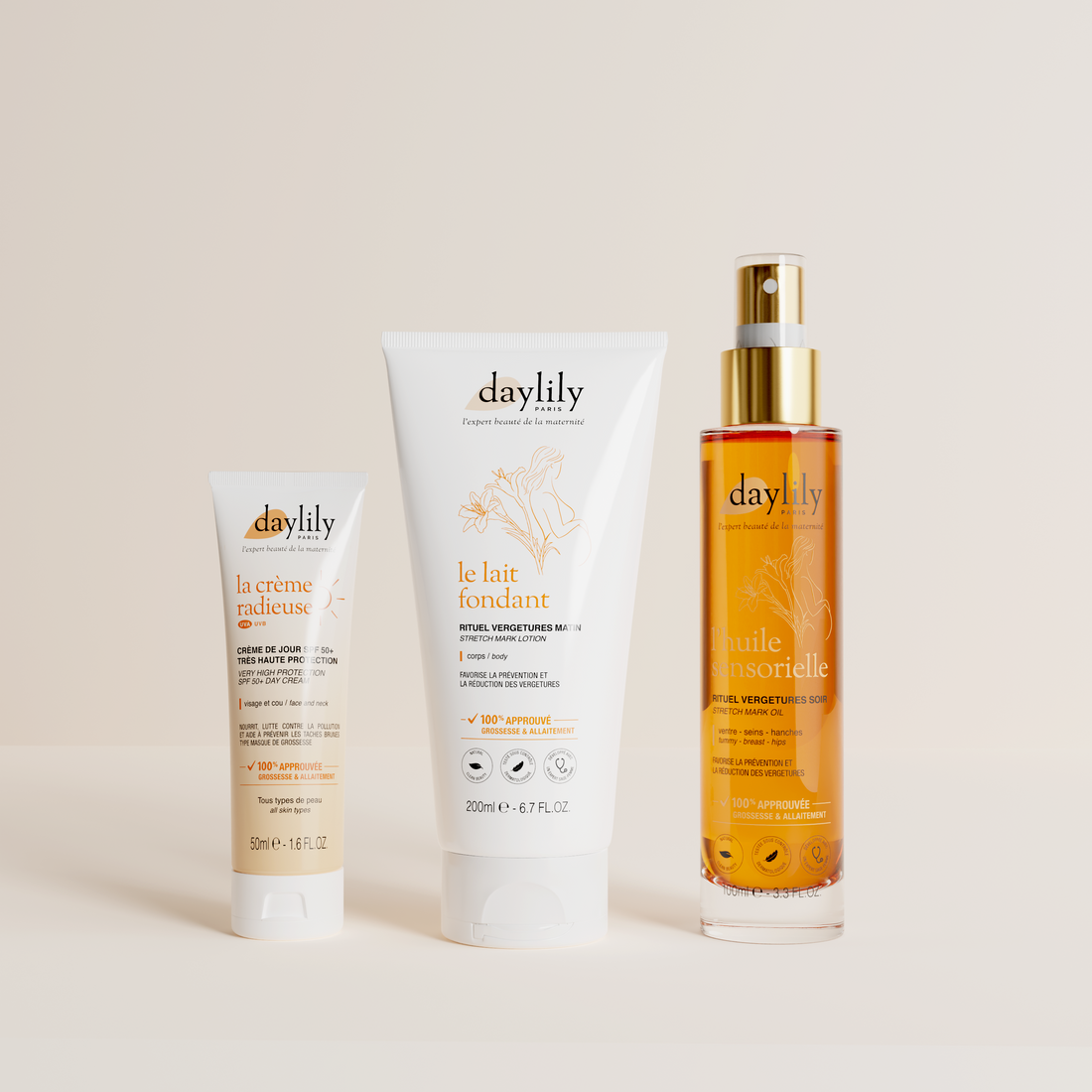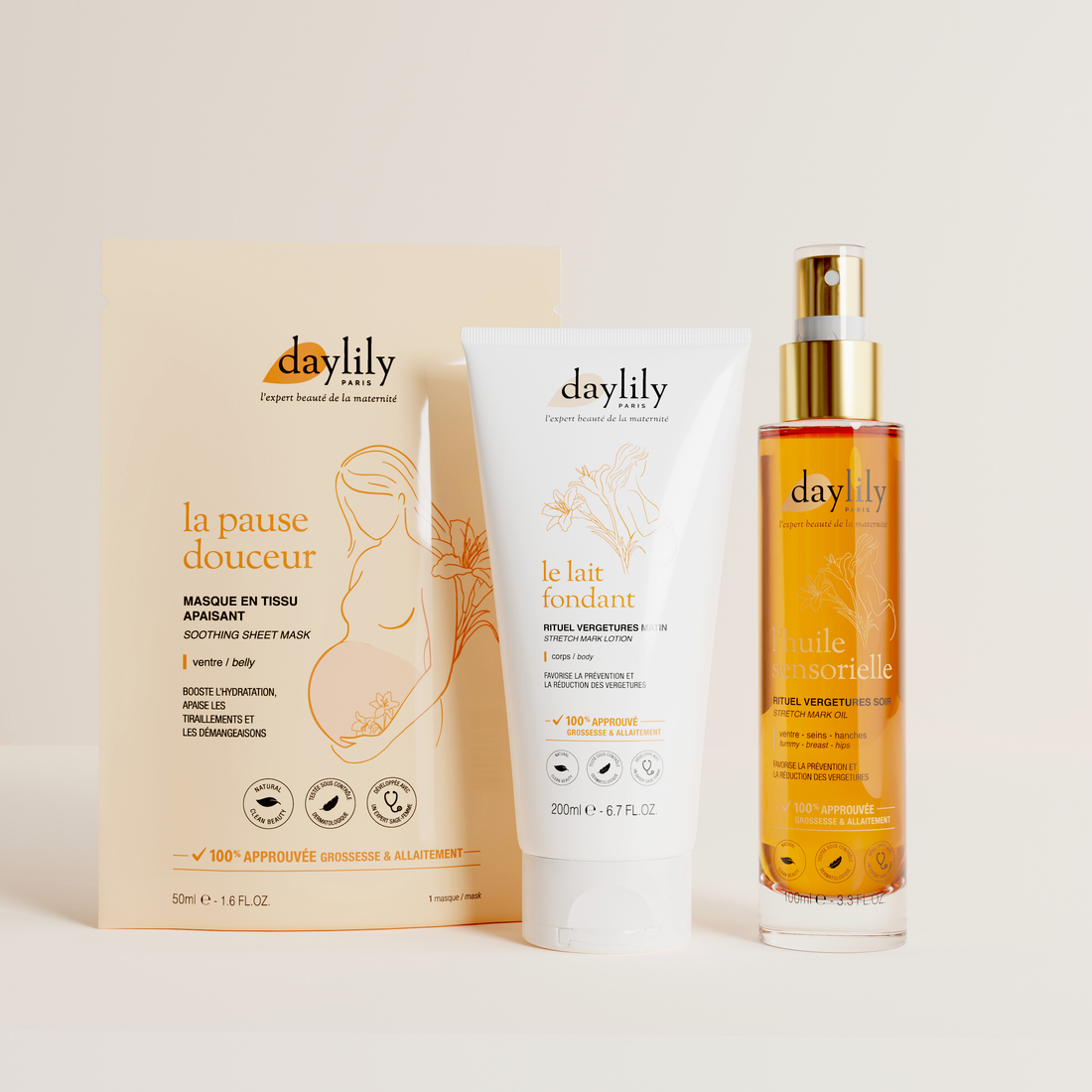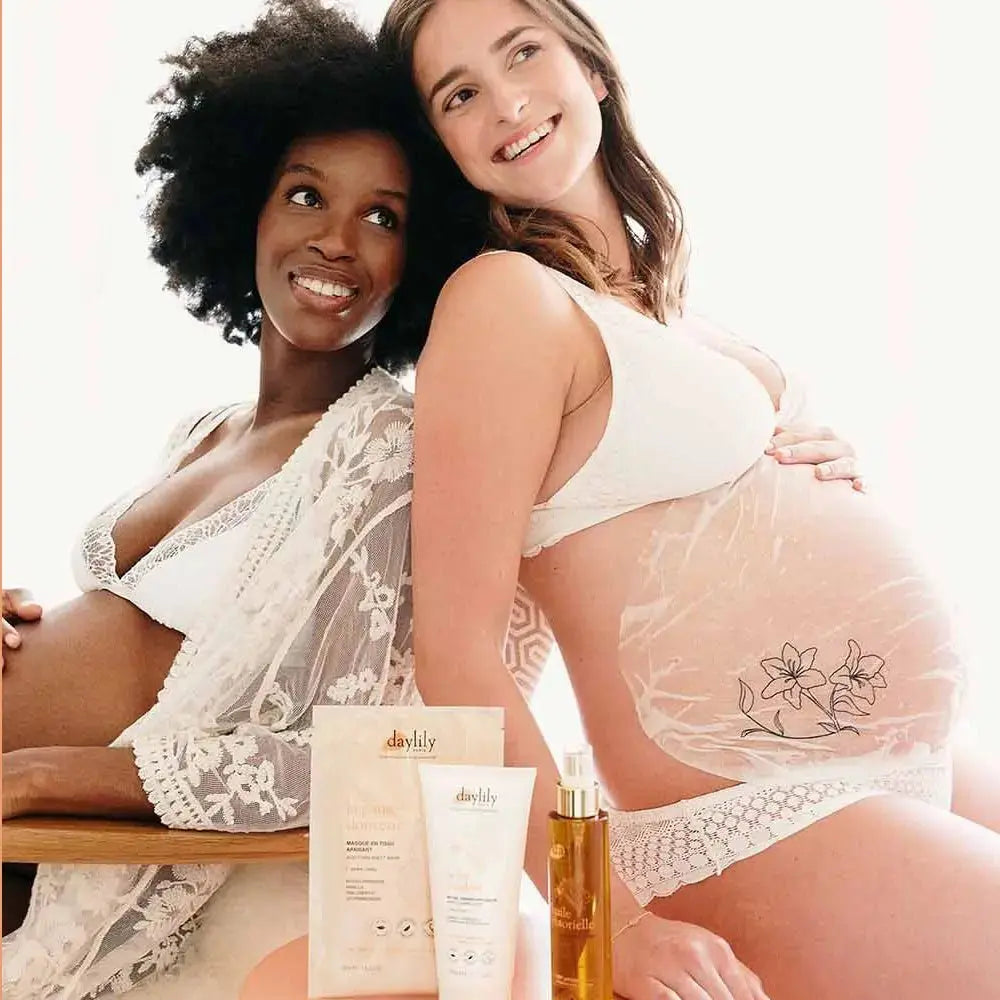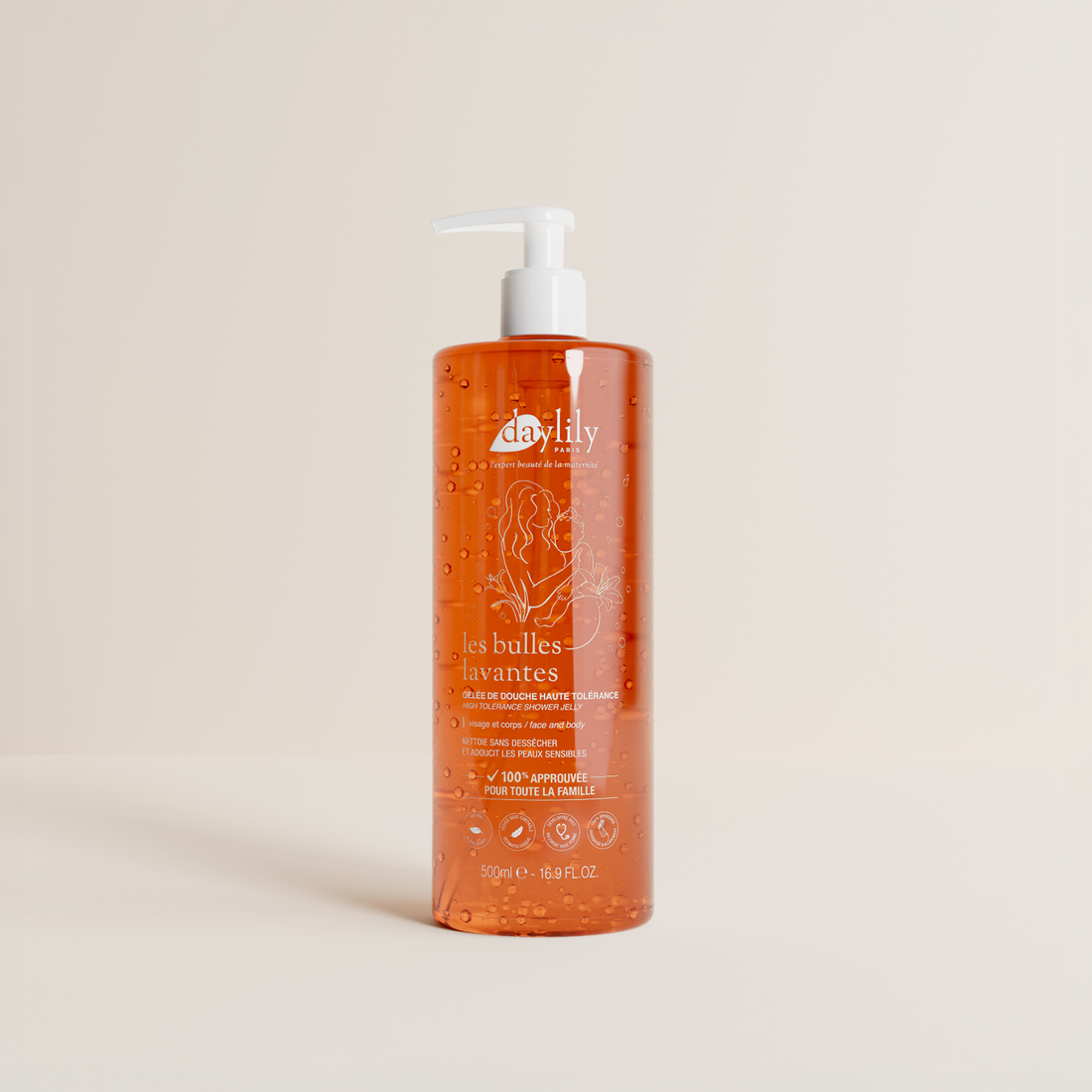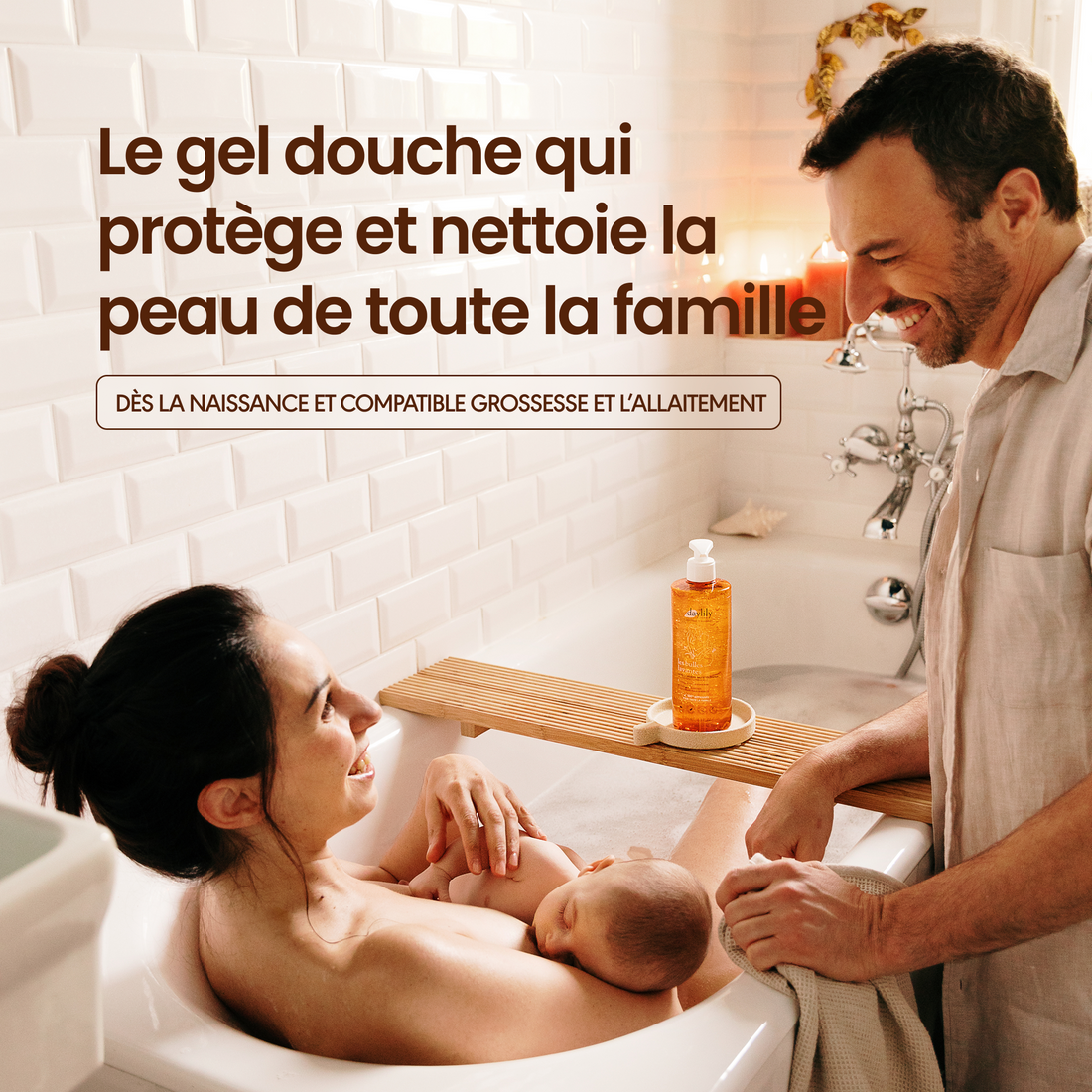Daylily Paris is a brand of clean, sensory and effective skincare products, made in France and 100% compatible with pregnancy and breastfeeding. We are also committed to sharing quality information for informed and uninhibited motherhood.🧡
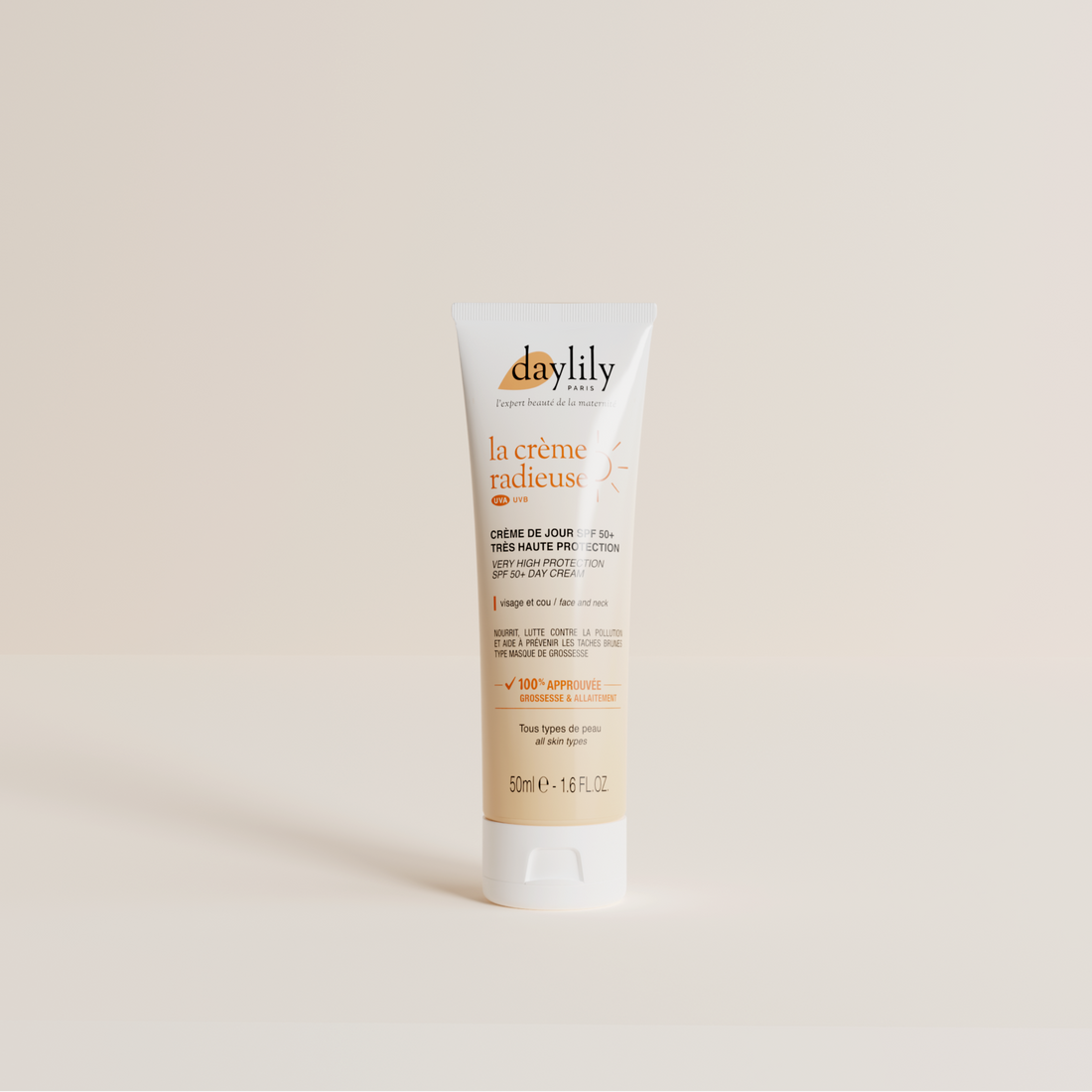
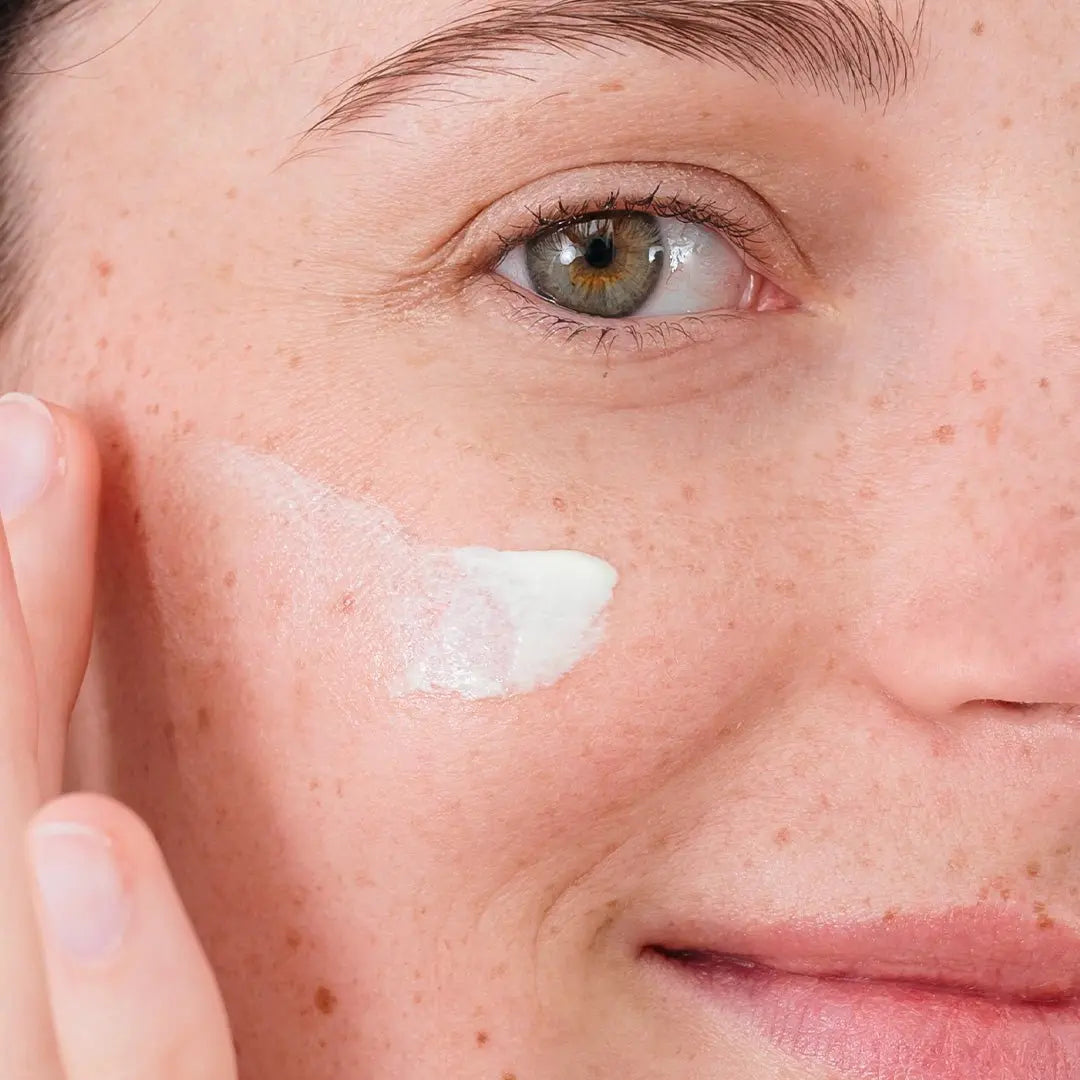
- Regular price
-
24,90 € - Regular price
-
- Sale price
-
24,90 €
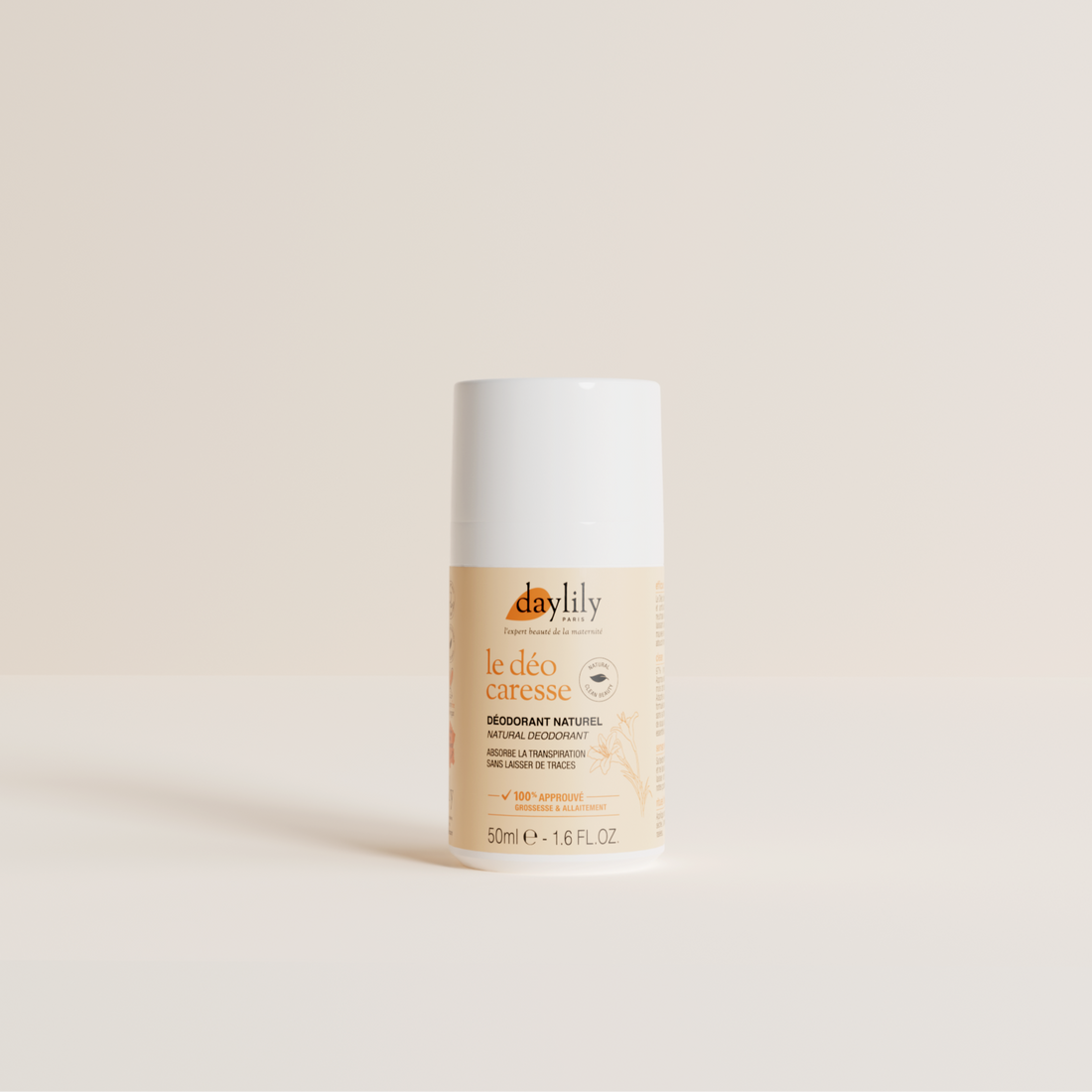
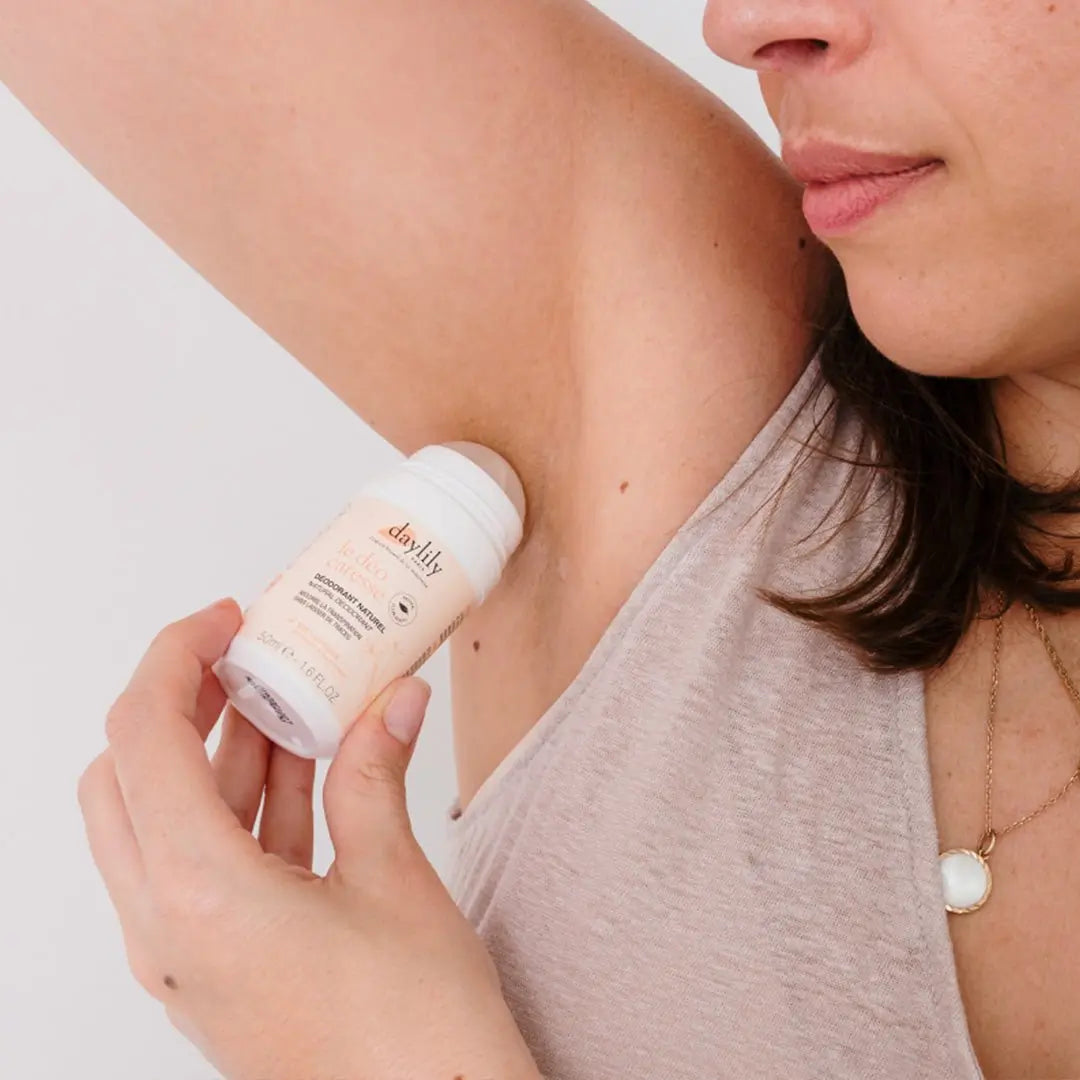
- Regular price
-
10,90 € - Regular price
-
- Sale price
-
10,90 €
- First of all, what does the job of expert toxicologist consist of?
- What are the conditions for practicing this profession?
- Do you have a specialization?
- Are food supplements subject to your assessment?
- What are your responsibilities as an expert toxicologist?
- Why is it important that the expert toxicologist is independent of the organizations with which he works?
- Can you explain to us the specificity of cosmetics intended for mothers and mothers-to-be?
- What is the penetration rate of cosmetic products, and why is it important to take it into account in the context of cosmetics for pregnant women?
- Would you say that their preparation is more complex than that of a conventional cosmetic product?
- How is it that certain products that contain controversial ingredients are authorized from the 4th month of pregnancy?
- In your opinion, is the organic label a guarantee of safety for mothers and mothers-to-be?
- What advice would you give to future and young mothers when choosing their cosmetic products?
- What risks can mothers and future mothers incur if they use cosmetic products not specific to pregnant women?
First of all, what does the job of expert toxicologist consist of?
The toxicologist is a scientist responsible for studying the effects of products on human health (drugs, medical devices, cosmetic products, biocides, chemicals, etc.). To do this, it analyzes the nature and composition of substances present in numerous products from industry, or naturally produced by animals or plants.
He then seeks to understand the undesirable effects of these substances on the body.
Once the toxicity or non-toxicity of the products has been determined, the toxicologist draws up a report, in accordance with the regulations for the product or substance evaluated, where he reports his evaluations, and in particular the risks and dangers for human health.
Since 1995, EUROTOX has had each National Society of Toxicology in Europe establish a list of Toxicologists.
For France, the title of Registered Toxicologist is conferred on any person meeting the criteria published by EUROTOX and the French Society of Toxicology (SFT). This is a quality and competence label awarded by EUROTOX to which this Company and the SFT attach high scientific value. On a legal level, the EUROTOX acronym, recognized throughout Europe and by international bodies with jurisdiction in Toxicology, is registered in Switzerland in Zurich.
What are the conditions for practicing this profession?
- Hold a Doctorate level diploma (University doctorate, state diploma of doctor in Pharmacy, Medicine, Veterinary, sciences) or an engineering diploma. Any diploma, recognized as valid, obtained in France, Europe, the United States or Japan, in particular of the PhD type, is acceptable.
- Prove a specialization in Toxicology (diploma, certificate of internship, training follow-up, etc.), in a brief curriculum vitae accompanied by the list of publications and works and a certificate of employment in one of the fields of Toxicology issued by his employer.
- Be able to demonstrate at least five years of professional activity in Toxicology post-study and be active at the time of registration or be looking for a job after having acquired the required experience. It is obligatory, for a first registration, to indicate two or three people (ERT, DABT or equivalent experience) from different companies who can attest to the professional qualities and real activity of the applicant.
Registration is valid for a period of five years. Renewal every five years upon written request from the interested party provided there is proof of activity in the field.
Do you have a specialization?
Products intended for topical application, therefore many cosmetic and dermocosmetic products, but not only that.
Are food supplements subject to your assessment?
This can happen, but I limit myself only to the toxicological part of the substances included in the composition. This part is based on bibliographic data which, if insufficient, may lead me to recommend additional studies.

What are your responsibilities as an expert toxicologist?
Full responsibility for the conformity of the established file and the conclusion, depending on the nature of the product, its category and the regulations on which it depends. As these files are established from the data provided by the applicant, the expert must analyze their veracity and compliance with the constraints of the regulations linked to the product.
However, it is not responsible for forgeries that it cannot detect, hence the importance of working in collaboration and trust with the laboratories.
Why is it important that the expert toxicologist is independent of the organizations with which he works?
The subject of independence is complex but to summarize generally: the independence of scientific expertise is based on three pillars: respect for deontology and ethics against any risk of conflicts of interest, a framework of expertise and the guarantee of a diversity of scientific sources, from public or private research organizations.
Can you explain to us the specificity of cosmetics intended for mothers and mothers-to-be?
The overall safety of a cosmetic product includes the following key elements:
- Ingredient selection criteria : The selection of ingredients must be carried out through specific monitoring of technical regulatory developments in the field of cosmetic ingredients establishing the acceptability criteria of the ingredients. Particular emphasis must be placed on safety data and attention must also be paid to the irritant and sensitizing potential of the ingredients used.
This ingredient selection process therefore involves preliminary expertise. Indeed, particular attention must be paid to the raw materials used. The emphasis on safety must be placed through the characteristics of the ingredients such as:
- The irritant potential : evacuation of irritating substances and adaptation of the concentration to the formulation
- Sensitizing potential : absence of substances classified as H317 (which may cause a skin allergy) and allergens which may come from perfume.
- The toxicological profile of the ingredients : Indeed, certain substances are considered inappropriate and their avoidance is imperative:
- Essential oils : prohibited in cosmetics for pregnant women
- Endocrine disruptors : no known endocrine disruptors compared to the list on the European Commission website are formally prohibited (phthalate, bisphenol A, etc.)
- Nanomaterials : as defined to date in Article 16, page 70 of Regulation (EC) No. 1223/2009.
- Animal testing : Any substance subject to animal testing in accordance with Article 18, page 71 of Regulation (EC) No 1223/2009
- Candidate substances for the REACH regulation : REACH is a European regulation that came into force in 2007 to secure the manufacture and use of chemical substances in European industry. This involves identifying, evaluating and controlling chemical substances manufactured, imported and placed on the European market. Annex XIV corresponds to the list of candidate substances of very high concern (SVHC), in terms of toxicity.
- Exposure assessment : which aims to quantify the quantity of the product during normal use which comes into contact with other parts of the body such as the mouth, mucous membranes.
- Local formulation compatibility : local tolerance tests adapted to the target and the claims
- Microbiological quality and conservation
- Physico-chemical characteristics : and associated technical risks
- Experience in market surveillance
A pre-assessment taking these elements into account is necessary before sending a product for development.

What is the penetration rate of cosmetic products, and why is it important to take it into account in the context of cosmetics for pregnant women?
Dermal (percutaneous, dermal) absorption is a comprehensive term that describes the transport of chemicals from the outer surface of the skin both into the skin and into the systemic circulation. Dermal absorption may result from occupational, environmental, or consumer dermal exposure to chemicals, cosmetics, and pharmaceuticals.
Yes, it is a major parameter for the approach to systemic toxicity because in the majority when a substance crosses the skin and therefore passes into the blood circulation, the substance is found in the placenta and in contact with the fetus.
Would you say that their preparation is more complex than that of a conventional cosmetic product?
Yes for the reasons mentioned above.
How is it that certain products that contain controversial ingredients are authorized from the 4th month of pregnancy?
A priori this is because they are suspected of a teratogenic risk.
Generally there are 4 main periods of risk for exposure to a substance in pregnant women:
- From the day of fertilization to the 12th day of pregnancy, a drug if it is toxic to the embryo causes a spontaneous miscarriage, this is the so-called “all or nothing” law.
- From the 13th day to the 10th week of pregnancy, corresponding to the embryonic period or period of organogenesis, the teratogenic risk is maximum.
- Until the month preceding childbirth corresponding to the fetal period or period of maturation and growth of the organs in place, we speak of a risk of fetotoxicity. A risk of malformation persists.
- At the end of pregnancy, taking medications exposes the newborn (perinatal period) to specific adverse effects (risk of impregnation then neonatal weaning).
In your opinion, is the organic label a guarantee of safety for mothers and mothers-to-be?
Not necessarily, it all depends on what is behind the organic label. If it is a cocktail of essential oils for example, although natural and organic, this is not a guarantee of safety.
What advice would you give to future and young mothers when choosing their cosmetic products?
Products without allergens and with as little fragrance as possible, at least in percentage.
Do not think that organic provides all the guarantees of safety. Preferably contact well-known brands with expertise in the field of products intended for pregnant and breastfeeding women because in general these laboratories respect the specificities described above and ensure a sufficient number of tolerance tests to evaluate tolerance local.
What risks can mothers and future mothers incur if they use cosmetic products not specific to pregnant women?
Impossible to answer in general. Everything will depend on the composition, therefore on the risk analysis of each substance included in the composition of the product and the sufficient tolerance tests which have been carried out.
Photo credit: Chokniti Khongchum



















